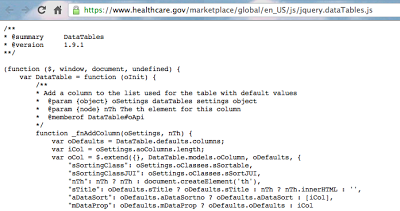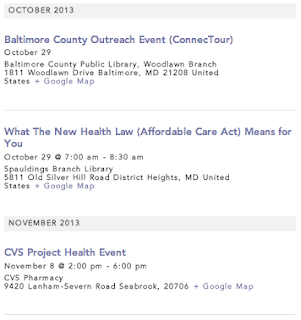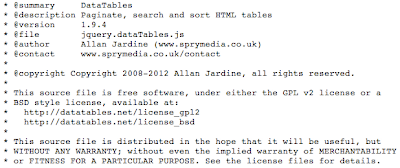The State of Maryland has been front and center on the launch of open enrollment through the new Obamacare insurance marketplaces on October 1. The week before the launch, President Obama
joined Maryland Governor Martin O'Malley in Largo, MD to boost public awareness of the marketplaces, and he said that if "every governor were working as hard as Governor O’Malley to make the Affordable Care Act work," even more Americans would reap its benefits.
In the intervening weeks, however, the Maryland Health Connection has had its share of problems. From
concerns about the privacy policy on the site to
functions not yet available to
low numbers of enrollees, the launch has been anything but smooth. Governor O'Malley
finally acknowledged it could be six weeks before the "glitches in the portal" might be worked out.
But even as the state concentrates on working on the problems of signing up Marylanders for individual policies, another deadline is approaching. The Small Business Health Option Program (SHOP) is
scheduled to kick off January 1, 2014 with coverage to start as early as March. And in the case of businesses, not only will the marketplace function as a place to select coverage, but will be responsible for billing employers and collecting payments on an ongoing basis; the money will then be remitted to the various insurers by SHOP. (Individuals can choose to pay the initial payment through the marketplace or directly to the insurer, but all future billings and payments are between the individual and the insurer.) Elizabeth Charlow, communications manager for SHOP in Maryland,
confirmed this in a September email to THE WEEKLY STANDARD:
All employer bills get handled by Maryland Health Connection (federal requirement) regardless of whether it's employee choice or employer choice. Individuals who purchase can make their first premium payment on Maryland Health Connection or they can elect to pay the carrier directly. For all subsequent bills, the carriers would send these to individuals directly.
According to Tequila Terry, director of plan and partner management, the employer would not get multiple bills. The SHOP would aggregate all carrier bills so the employer can make one payment. The Maryland Health Benefit Exchange would then distribute payment to the appropriate carriers on behalf of the employer.
To help businesses in Maryland prepare for their more complex relationships with the marketplace, the Maryland Health Connection had scheduled multiple public forums on SHOP throughout the state. On October 4, the Maryland Chamber Action Network
published the following on its website:
Maryland Health Connection Holding Small Business Forums
The Maryland Health Connection will hold a series of small business forums around the state to educate small business owners about the new Small Business Health Options Program (SHOP), which enables small businesses and their employees to compare and select from a variety of qualified health plans that suit their needs and budgets. SHOP is a program of Maryland Health Connection, the state’s new online health insurance marketplace.
Attend one of the upcoming forums to learn more about:
- Background of the Maryland Health Benefit Exchange.
- Implementation and timeline.
- Plan levels of coverage.
- Health care tax credits for small business.
However, on October 16, the notice was
deleted and the
following was posted:
Maryland Health Connection Small Business Forums Postponed
The Maryland Health Connection has postponed the Small Business Forums, which were scheduled to begin later this month have been postponed. We will let you know if they are rescheduled for a later date. More information about the Maryland Health Connection is available on its website.
When contacted via email, William Burns, Director of Communications for the Chamber Action Network, a state-wide alliance of Maryland chambers of commerce, said he didn't know why the forums were postponed, but he expected "to reconnect with them in the next couple weeks about rescheduling." An email to the Maryland Health Connection from THE WEEKLY STANDARD inquiring about the postponements has so far gone unanswered.
However, the announcement from the Chamber Action Network is not the only indication of the postponements. Multiple scheduled forums that had at one time appeared on the Maryland Health Connection's calendar of events have been deleted without comment. Events had been listed for
Salisbury,
Hagerstown,
Baltimore (
2),
Takoma Park,
Waldorf (
2),
Largo,
Elkton, and
Wye Mills. (All the event links provided here are from cached versions of the pages.) Now, all the events have vanished from the site and are met with "
Oops. Page Not Found." messages. Below are screen captures of some of the event listings:
In addition, the extended calendar
used to reflect the upcoming SHOP forums:
One
event that is still on the schedule of the Maryland Health Exchange Board, the group that runs the Maryland Health Connection marketplace (including SHOP), is scheduled for October 31 in Beltsville, MD, and states that "Manager of Producer Operations Rebecca Bayne will present an overview of where the Exchange is going, as well as provide a SHOP overview." In light of recent events, as well as in light of recently cancelled events, there may indeed be increased interest in what the board has to say about "where the Exchange is going."

































